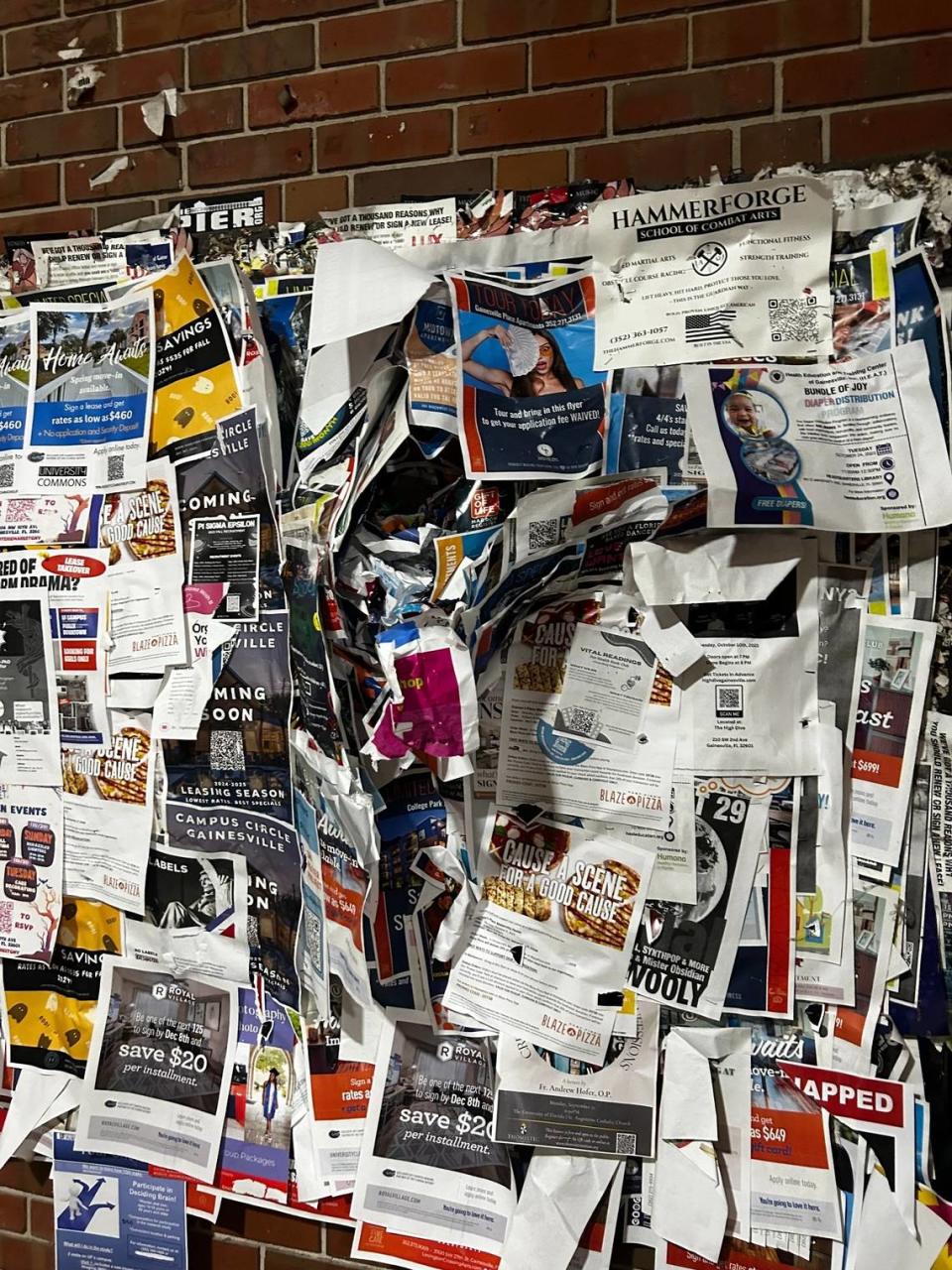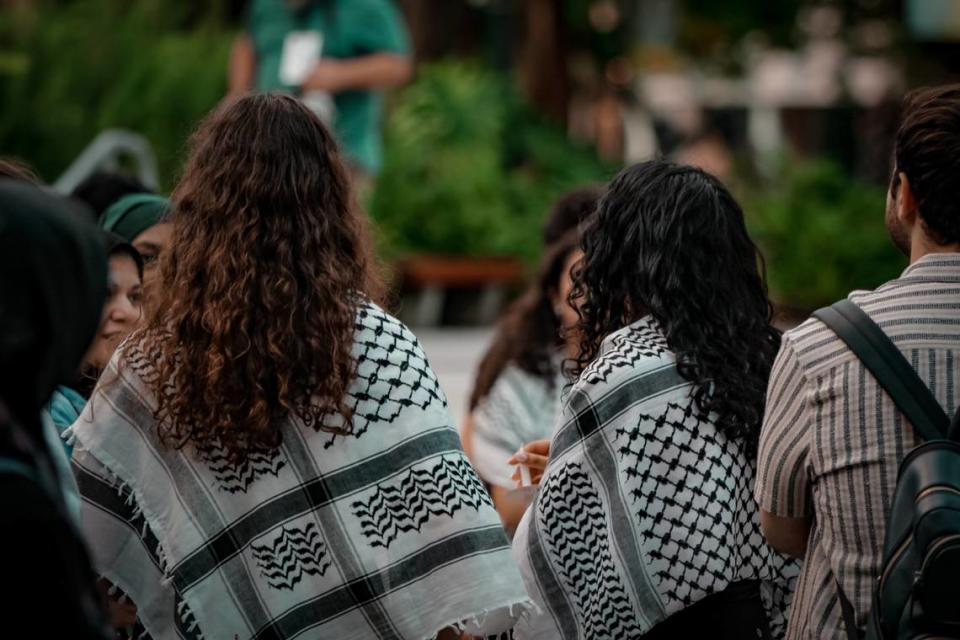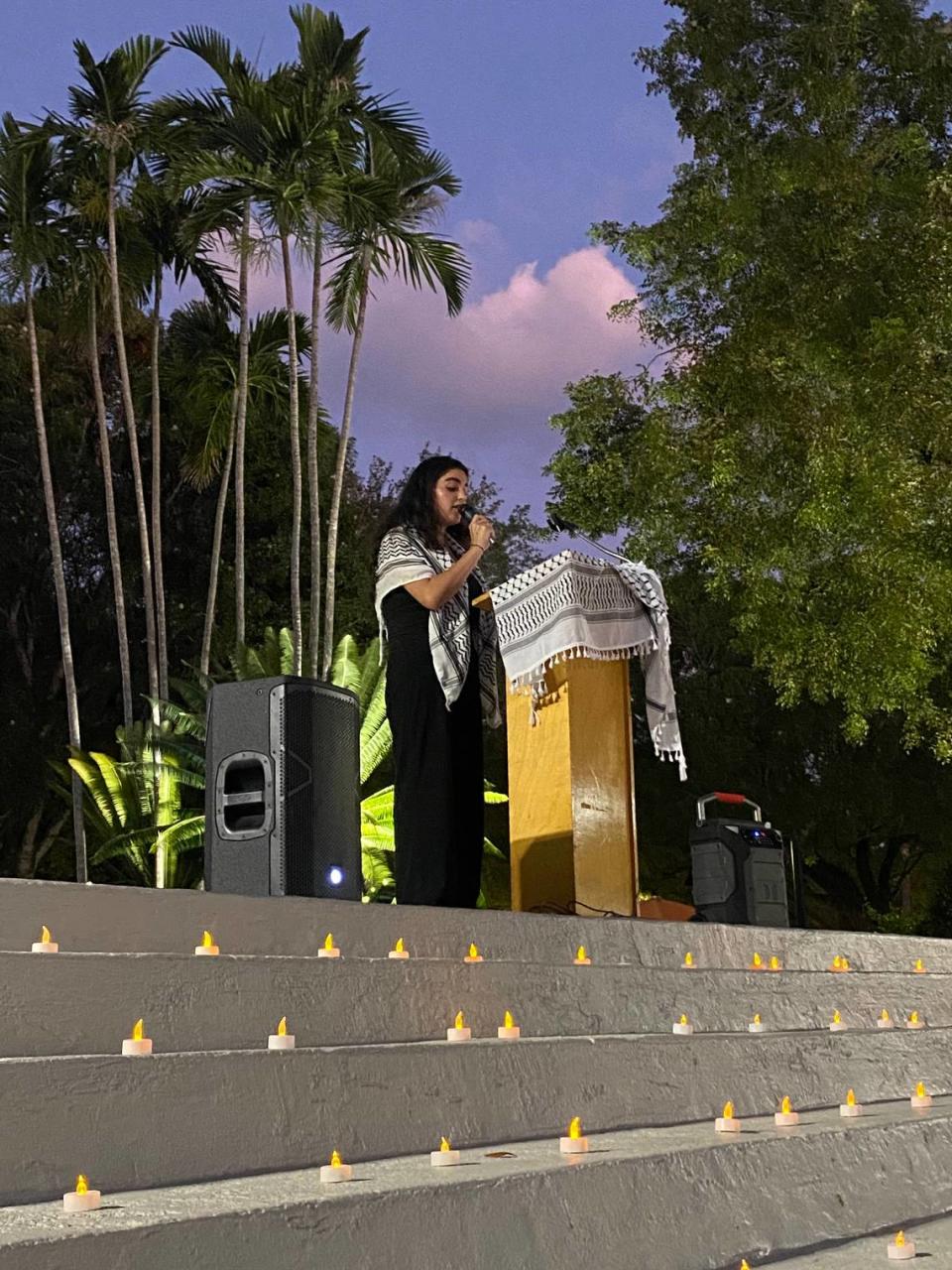‘Shouldn’t be a war that’s fought on a college campus.’ Tensions rise for Florida students
When Mona Abuzahra moved from the West Bank in 2020 to begin her freshman year at the University of Miami, she was struck by how little Americans knew about Palestinian life.
Many UM students assumed all the Palestinians living in the two territories in the Middle East — the West Bank and Gaza — were governed by Hamas, the armed Palestinian militant group that attacked Israel on Oct. 7. Unlike the Gaza Strip, which has been ruled by Hamas since 2007, some areas of the Israeli-occupied West Bank are administered by the Palestinian Authority.
“Their view of Palestinians is fully Hamas. They don’t see us as humans,” she said. “We are not recognized as normal people ... People just aren’t well informed. They just don’t know what Palestine is, one. And, two, if they do know what it is, they think we’re animals.”
Across South Florida and the country, Palestinian, Middle Eastern and Muslim students have been dealing with the fallout from escalated violence in Israel and Gaza. Student attempts to speak out for Palestinian rights — including calls for a ceasefire between Israel and Hamas — have been met with Islamophobia and obscenities in some instances, students say.
Jewish college students have also been impacted, with a spike in antisemitic incidents reported at universities in Florida and other parts of the country. On Tuesday, a student at Cornell University in New York was arrested and accused of posting online death threats that targeted the school’s Jewish community.
At the University of Florida in Gainesville, posters of hostages who were abducted during the attack were ripped down Tuesday from two bulletin boards near the entrance to Library West. Hamas is believed to be holding more than 240 hostages, including at least 33 children, according to a report Thursday in the New York Times, which cited the Israeli government.
“It’s a true reminder to me and to all my Jewish friends here and across the country that antisemitism really never goes away,” said Spencer Levine, a UF senior. “It just takes on different forms.”
Both Jewish and Muslim students say they’ve been unfairly conflated with the actions of the Israeli government and Hamas, and point to steps taken in the U.S. political arena. Last week, the head of Florida’s state university system ordered UF and the University of South Florida in Tampa to deactivate chapters of Students for Justice in Palestine, alleging they violated a state law that makes it a felony to “knowingly provide material support ... to a designated foreign terrorist organization.” The United States designated Hamas a terrorist group in 1997.
The group’s supporters say the students are protected under the First Amendment of the Constitution and are advocating for Palestinian freedom — not terrorism.
READ MORE: Florida orders pro-Palestinian student group off its university campuses
For Abuzahra, the UM student, the challenges of attending an American university as a Palestinian student began well before the war. Her freshman year, one student asked her why she didn’t want peace. Another asked if she drove a camel to school.
“Campus isn’t the most welcoming place,” she said.
Since the start of the war, Abuzahra said she has lost multiple friends in Gaza, including a journalist.
More than 9,000 Palestinians have been killed since the war began, the Gaza Health Ministry said Thursday, including more than 3,700 Palestinian children, the Associated Press reported. During the Hamas attack, more than 1,400 people were killed in Israel, including 31 American citizens and at least 260 young people attending the Supernova music festival.
READ MORE: These South Floridians were in the region when Israel was attacked. They’re still there
Students want deeper understanding of conflict
Mohamed Ghumrawi, founding faculty director of FIU in the Middle East, a study-abroad program that takes students to Jordan, Israel and the West Bank to introduce them to the geopolitical dynamics in the region, said most students just want to understand the conflict.
“What we’re seeing is students who are curious about this issue,” said Ghumrawi. “They want to create a better world and so when they see violence and killing in this specific conflict between Palestinians and Israelis, they have a sense to want to understand it more.”
In his courses about Arab-Israeli conflicts, Ghumrawi skipped a scheduled lecture so students could ask questions about the unfolding situation. The result looked far different from some of the widely covered campus protests.
“A lot of my students are also very respectful in the classroom; they know how to deal with opposing viewpoints,” he said. “It’s not like a fight broke out, or students were arguing with each other — it was really just a very positive intellectual dialogue and discourse.”
Ghumrawi sometimes forgets how little people know about the situation in Israel and the Palestinian territories. His friend — who was in the same master’s degree program as Ghumrawi — recently texted him admitting he didn’t know that people couldn’t travel in and out of Gaza with ease.
“‘What do you mean, you didn’t know people can’t go in and out of Gaza? Gaza has been under blockade for 17 years,’” Ghumrawi replied to his friend. “But for the average American, they don’t understand that. So when they hear the Israeli government is telling Gazans to leave, they think well, why aren’t people leaving? And it’s like, well, they can’t. They literally can’t leave.”
The Palestinian territory of Gaza has been under an Israeli blockade, backed by Egypt, since 2007 after Hamas seized military control over the entire strip. The blockade restricts many aspects of Palestinian life, including freedom of movement in and out of Gaza.
Israel, which has issued about 20,000 work permits for Palestinians in Gaza to work in Israel, says the blockade is necessary to isolate Hamas and prevent the smuggling of weapons into the territory. Hamas has vowed to annihilate Israel and has been responsible for many suicide bombings and other deadly attacks on civilians and Israeli soldiers.
But for the more than two million Palestinians who live on the tiny coastal strip of land, Israel’s blockade has deteriorated Gaza’s living conditions, healthcare access and infrastructure, according to humanitarian organizations.
On campus, misinformation surrounding the conflict runs rampant, says Zuhra Akhtar, a Muslim student at Florida International University and a member of Students for Justice in Palestine.
She said that signs advertising a walk-out to support Gaza’s liberation were ripped down across campus.
“It’s sort of like its own level of McCarthyism in a way,” said Akhtar, 22, who was born and raised in Miami.
Yet, at a recent pro-Palestinian protest on campus, Akhtar said people showed up in support, although counter-protesters yelled obscenities. She said her group often gets called “Nazis” and “terrorist sympathizers” in-person and online.
Akhtar said she doesn’t feel like she can continue living in Florida after graduation: “Despite the fact that I might have grown up here and live here … I’m still not seen as somebody who belongs here.”
‘Students are scared; they’re confused’
Jewish students and faculty on South Florida campuses have been deeply concerned about the rise in antisemitism since the war.
Last weekend, threatening statements toward the Jewish community at Cornell University were posted on an internet discussion board. Patrick Dai, 21, a junior at the school, was arrested Tuesday and charged with “posting threats to kill or injure another using interstate communications.” In one post, he threatened to “bring an assault rifle to campus and shoot all you pig jews,” the Washington Post reported, citing federal prosecutors.
Levine, the senior at UF, is grateful for the support the Jewish community has received from UF’s president.
During an appearance on “Fox News Sunday,” UF President Ben Sasse, the former Nebraska Republican senator, said: “We’re gonna do two things in Florida. We’re going to protect Jewish students, and we’re going to protect speech.”
But Levine remains angry about the hostage posters being torn down.

“I can’t say that I was necessarily surprised, but I was livid,” he said. “Those posters were kind of just there to put faces onto the numbers. And to see them violently ripped off really struck a chord with me, because they’re just victims in this whole situation.”
Jon Warech, executive director of the Hillel chapter at FIU, said Jewish students, many of whom have close ties to Israel, have been struggling to mourn the loss of their loved ones while keeping up with classes.
“Students are scared; they’re confused,” he said. “There’s nobody that isn’t more than one degree removed from knowing somebody who is affected directly by this terrorist attack on October 7.”
While the pro-Palestinian protests on campus have been peaceful, Warech said Jewish students feel like they have to defend Israel.
FIU, which has the 14th-largest Jewish student population in the country, has always been a welcoming place for Jewish students, said Warech. Still, after seeing threats against Jews on other college campuses, Jewish students remain on edge, he noted.
“They come to school with a different energy than they had before,” he said. “This shouldn’t be a war that’s fought on a college campus.”
The increased tension between student groups has led to a heightened police presence on campus, but no threats have been reported, said Alexander Casas, FIU’s chief of police.
“We understand that the current charged environment may lead to some feeling uncomfortable and even unsafe. However, on our campuses, while we have had some emotional displays, we have not seen or been made aware of any confrontations,” Casas said in a statement to the Miami Herald.
Even before the start of the war, antisemitic incidents were at an all-time high in Florida, with many attributed to white supremacist hate groups, according to a 2022 audit released earlier this year from the Anti-Defamation League, a nonprofit that tracks and combats antisemitism.
Disbanding student groups
Last week, State University System Chancellor Ray Rodrigues sent a letter to the state’s 12 university presidents, directing them to deactivate campus chapters of Students for Justice in Palestine, accusing the group of being in “support of terrorism.”
The letter said that a “toolkit” released by the national group described the Oct. 7 Hamas attack on Israel as “the resistance” and “unequivocally states: ‘Palestinian students in exile are PART of this movement, not in solidarity with this movement.’”
The chapter at the University of Florida has called the move “disgraceful.” A statement from the South Florida Muslim Federation noted the protests were peaceful and that the move by Gov. Ron DeSantis “goes against freedom of speech.” Associating students with a designated terrorist organization, the statement noted, “puts their lives in danger.”
The Israeli Consul General at a recent press conference in Miami condemned the protests at colleges and universities. “With all due respect to freedom of speech, those who are now protesting against Israel protecting themselves are a part of the problem,” said Maor Elbaz-Starinsky.
“This is pure evil against good,” he added. “This is darkness against light.”
‘Growing up there you kind of become numb’
Abuzahra, the Palestinian student from the University of Miami, grew up in the West Bank, where her parents, teenage sister, and extended family still live.

Although she attended an American school, her daily life was impacted by lockdowns and raids. It wasn’t until she moved to Miami that she realized these practices weren’t normal.
“I only noticed that once I came to the US,” she said, “because growing up there you kind of become numb and accustomed to a lot of things that aren’t meant to be okay — in terms of safety, and just living conditions.”
She’s now a senior at UM, where she studies political science, international relations and Arabic studies. She was one of the leaders at a recent UM vigil for Palestinians, where 100 candles were lit, representing Israelis and Palestinians killed in the conflict. She read the words of a friend killed in the war. She recited them first in Arabic, then in English: “We won’t leave. We will ascend from Gaza to the sky, and to the sky’s serenity alone.”
Toward the end of the event, while Abuzahra was speaking with journalists from the student paper, a group said disparaging things in the background. She heard one person announce, “No wonder no other Arab country wants those, because they’re f*****g pieces of scum.”

Abuzahra’s greatest solace over the past few weeks has been contact with her family and friends at home.
“Despite the time zone difference and despite what’s going on back there, I know that wherever I am, they’ll be there for me and I’ll be there for them, even if I don’t have a strong support system near me,” she said.
Since the war, many universities and schools in the West Bank have moved online, including her 13-year-old sister’s middle school classes. And this week, the situation in Nablus, the city she is from, has worsened. Raids have become so frequent, Abuzahra’s mother has stopped telling her when they occur, she said. Two of her high school teachers have been arrested. And her group chat with friends in Gaza is filled with messages checking in on one another after bombings and raids.
“People are just in a state of complete despair,” she said. “Just continuing your day-to-day life almost seems pointless.”
Alongside the despair, she said, there is also hope.
“I’m very proud that I grew up there and proud of my people,’’ she said. “But I’m very sorry for all the losses... whether it was on the Israeli or the Palestinian side. A lot of innocent civilians are still being killed.”
This story was produced with financial support from Trish and Dan Bell and from donors comprising the South Florida Jewish and Muslim Communities, in partnership with Journalism Funding Partners. The Miami Herald maintains full editorial control of this work.

